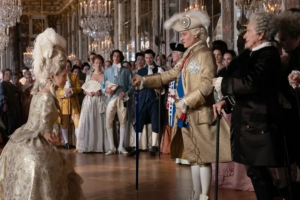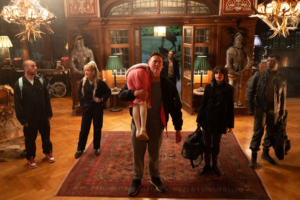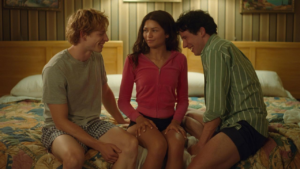Reviewed by GREG KING
Documentary
Director: Andre Singer.
What a powerful, moving but grim film to start the day with!
When the allied troops liberated the concentration camps in 1945 Allied soldiers, who had been specially trained as cameramen, filmed the stark conditions as a record of the atrocities committed by the Nazis. They captured some horrific and deeply disturbing images of malnourished and emaciated bodies, mass graves, the sick and elderly who had almost given up hope, and survivors who were too listless and weak to move.
And the soldiers talked about the smells, the foul stench and the spread of typhus through the camps. They were determined that what they saw at places like Bergen-Belsen, Dachau, Mauthausen and Auschwitz needed to be recorded permanently as a way of showing the German people what had been done in the camps, and to make them feel guilt at what they permitted to happen.
Under the direction of Sidney Bernstein, who during WWII served as the film advisor to the Ministry of Information, the Imperial War Museum in London painstakingly edited the raw documentary footage and shaped it into the film German Concentration Camps Factual Survey. They added a powerful and insightful narration written by journalist Richard Crossman to try and place the horrors of the camps into perspective. And apparently legendary film director Alfred Hitchcock, himself a close personal friend of Bernstein’s, was involved in offering advice on how best to shape the footage.
But due to political considerations in the brave and uncertain new post-war world, and the gruesome and harrowing nature of much of the raw footage, the project foundered and was buried away. It never saw the light of day, until a restoration project began work on shaping the material. Billy Wilder edited some of the available footage into a documentary for the US Army, under the title Death Mills. An incomplete version of the documentary screened on American television in the mid 80s under the title of Memory Of The Camps. German Concentration Camps Factual Survey actually screened at last year’s MIFF, where it was accompanied by a brief lecture on the historical significance of the film itself.
Producer Brett Ratner (best known as a director on films like the Rush Hour trilogy, Red Dragon, etc) and anthropologist turned director Andre Singer (a veteran producer of confronting documentaries like The Act Of Killing, etc) have helped produce this documentary tracing the efforts to restore the film to its original intent. They have mixed restored, rarely seen and supposedly missing archival footage with some potent interviews with many of the camp survivors and cameramen who shot the disturbing images. And many of those are still moved and distressed by what they encountered sixty years earlier, visibly breaking down on camera as they recall the sights and smells.
There have been other films, like Alain Resnais’ 1955 short film Night And Fog, that have also explored the horrors of the Holocaust and the Final Solution in confronting fashion. With some graphic and disturbing images of emaciated and skeletal bodies being bulldozed into a mass grave, this moving and disturbing documentary conveys the horrors of the Holocaust more powerfully than any handful of other documentaries or fictitious films on the subject. Helena Bonham Carter’s reverent narration adds gravity to the film and places the material in perspective.
Night Will Fall is eye opening and gut wrenching stuff. The producers of Night Will Fall are obviously hoping that their film will offer a salutary history lesson, and serve as a reminder that these atrocities of war should never be forgotten.
★★★★




